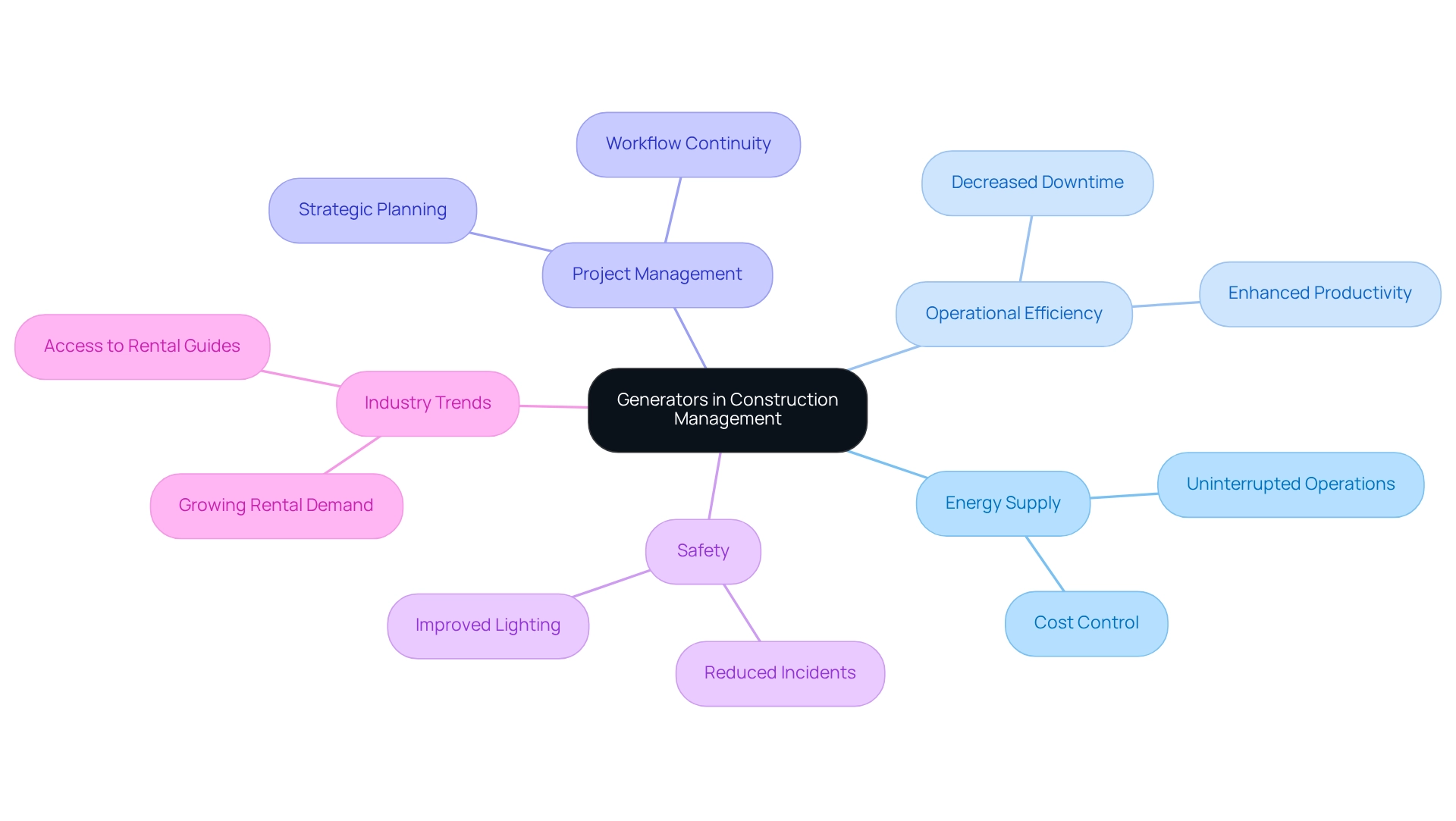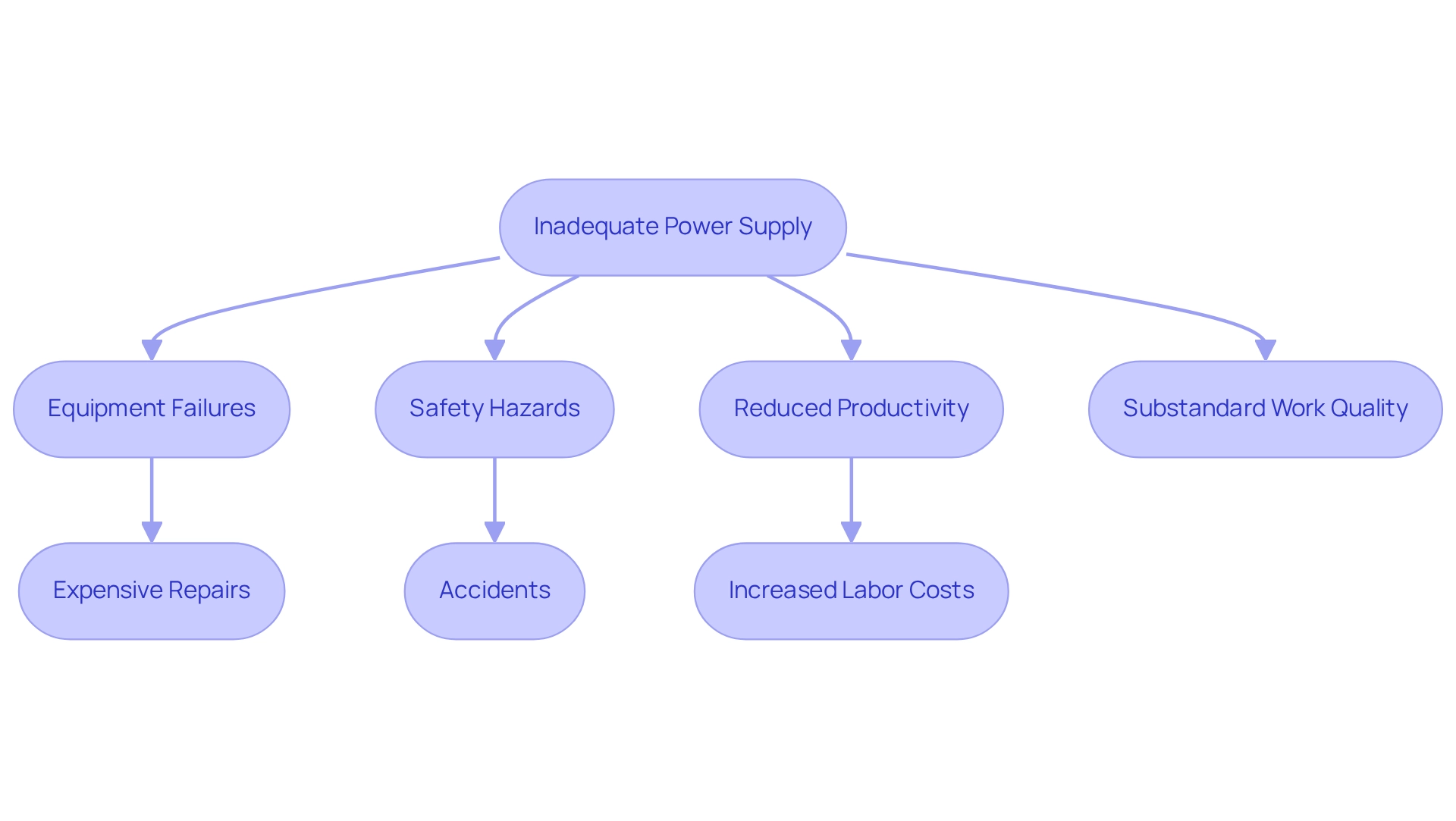Overview
The presence of a 13,000-watt generator significantly enhances construction efficiency by delivering reliable power for multiple tools and machinery simultaneously. This capability minimizes downtime and boosts productivity. Additionally, generators play a crucial role in preventing delays, reducing labor costs, and improving safety on construction sites. Their critical function in maintaining workflow continuity ensures that project deadlines are consistently met.
Key Highlights:
- Generators are essential for construction management, providing energy for tools, machinery, and lighting.
- Reliable power sources prevent delays, control costs, and enhance safety on construction sites.
- Heavy machinery efficiency relies on power, with studies indicating up to a 30% decrease in downtime when using generators.
- A 13,000-watt generator supports multiple tools simultaneously, enhancing productivity and safety.
- Proximity of power sources minimizes setup time and reduces downtime due to electricity disruptions.
- Inadequate power supply can lead to equipment failures, safety hazards, and increased labor costs.
- Safety measures are compromised without adequate energy, contributing to accidents and injuries on site.
- Strategic generator placement and maintenance are crucial for seamless construction workflows.
Introduction
In the dynamic world of construction management, the role of generators is crucial. These powerful machines serve as the backbone of productivity on job sites, supplying the essential energy required to operate tools, machinery, and lighting—especially in remote locations where access to the electrical grid is limited. As the demand for efficiency in construction continues to rise, recognizing the significance of reliable power sources becomes paramount.
Generators are not merely conveniences; they are critical components that can significantly impact project success, reducing downtime and enhancing safety. This article explores the various aspects of generator usage in construction, highlighting their benefits, the importance of proximity, and the risks associated with inadequate power supply.
Strategic planning around power can lead to successful project outcomes.
Understand the Critical Role of Generators in Construction Management
Generators play a crucial role in building management, delivering the necessary energy to operate tools, machinery, and lighting effectively. Their presence guarantees uninterrupted operations, especially in remote locations devoid of electrical grid access. A reliable energy source is essential for meeting deadlines and controlling costs; without backup systems, construction sites face significant delays, increased expenses, and safety hazards due to inadequate lighting or power for essential equipment.
The operational efficiency of heavy machinery, vital for tasks such as excavation, lifting, and demolition, heavily relies on power sources. Their importance extends beyond mere convenience; they are integral to the planning and execution of construction projects, ensuring that all activities proceed as scheduled. In fact, studies show that projects utilizing power sources can decrease downtime by as much as 30%, markedly boosting overall productivity.
Furthermore, the role of power sources in project management is underscored by industry insights, which highlight their significance in maintaining workflow continuity. As construction professionals increasingly recognize the necessity of reliable power supplies, the demand for rental units, particularly a 13000-watt generator near me, continues to grow. This trend reflects a broader understanding of how essential power sources are for achieving efficiency and success in construction projects.
Incorporating generators into project planning not only optimizes operations but also fosters a safer work environment. With adequate energy, teams can work more effectively, reducing the likelihood of incidents stemming from poor lighting or equipment failures. As Brittany Parsons insightfully remarks, "I think the most important thing we can teach women is to never settle. The world will always try and find ways to tell you ‘no.’ In reality, the possibilities are endless." This perspective resonates in project management, where overcoming obstacles is vital for success.
Moreover, managers can access complimentary rental guides from EZ Equipment Rental to help select the right equipment for their needs, further emphasizing the importance of dependable energy sources in achieving project goals. As the construction landscape evolves, the strategic use of power sources will remain a fundamental element of effective management.

Explore the Benefits of a 13,000-Watt Generator for Construction Projects
Having access to a 13000-watt generator near me provides substantial advantages for building projects, primarily due to its impressive energy output. This capability enables the simultaneous operation of various tools and equipment, including:
- Saws
- Drills
- Lighting systems
These are crucial for sustaining productivity on site. Furthermore, the dual fuel functionality of many 13,000-watt machines enhances versatility in fuel selection, allowing teams to adapt to changing fuel availability and costs. The robust construction of these devices ensures durability and reliability, making them well-suited for the demanding conditions often faced on construction sites. In addition, their portability facilitates easy relocation as project needs evolve, guaranteeing that power is readily accessible wherever it is most needed. Overall, utilizing a 13000-watt generator near me can significantly boost efficiency, minimize downtime, and enhance safety on construction sites.
Assess the Importance of Proximity: Why a Nearby Generator Enhances Project Efficiency
The proximity of a power source to a construction site significantly enhances project efficiency. When a device is situated nearby, it minimizes the time and effort required to transfer energy to various tools and equipment. This accessibility allows workers to swiftly connect to energy sources, thereby reducing delays associated with setup or equipment failures. Moreover, having a backup source close at hand enables prompt responses to electricity disruptions, effectively preventing costly downtime.
Furthermore, the ability to quickly relocate a backup source as project demands evolve further streamlines operations. A nearby power source also bolsters safety by providing adequate illumination and energy for tools, thus decreasing the likelihood of accidents in poorly lit areas. Research indicates that strategically positioning power sources can lead to a remarkable increase in site productivity, with average time reductions of up to 20% on energy-related tasks. Additionally, implementing LEAN training can help eliminate unproductive practices and optimize resources, further enhancing effectiveness on construction sites.
Practical examples illustrate the impact of equipment proximity on construction workflows. For instance, construction companies utilizing local power sources report smoother operations and heightened team morale, as employees can focus on their responsibilities without the disruption of power outages. The California Air Resources Board highlights that one hour of a single portable gasoline device generates as much smog-forming pollution as operating an average passenger vehicle for approximately 250 km, emphasizing the importance of selecting devices that are both efficient and environmentally friendly.
In summary, the strategic placement of these machines is vital for maintaining a seamless workflow and ensuring that construction tasks remain on schedule. Establishing service contracts for fleet maintenance can also ensure that generators are kept in optimal condition, allowing firms to focus on task execution rather than equipment issues. This combination of technology and strategic planning is essential for enhancing construction efficiency.
Evaluate the Risks of Operating Without Adequate Power Supply on Construction Sites
Working without a sufficient energy supply on construction sites poses significant hazards that can jeopardize project success. Inadequate energy often results in equipment failures, leading to expensive repairs and considerable delays. Furthermore, a deficiency in energy compromises essential safety measures, such as lighting and emergency systems, thereby increasing the likelihood of accidents and injuries. Statistics reveal that insufficient lighting contributes to numerous accidents, with forklift incidents alone responsible for approximately 85 deaths each year, underscoring the vital connection between energy supply and safety on-site.
The impact of inadequate energy extends to productivity as well; employees may find themselves unable to operate essential tools or machinery, resulting in prolonged timelines and increased labor costs. Real-world examples illustrate how construction delays frequently stem from electrical issues, with projects facing significant setbacks due to outages disrupting operations. Moreover, the inability to maintain a consistent energy supply can lead to substandard work quality, as tools may not function optimally without adequate electricity.
Expert opinions emphasize that safety preserves lives and reduces suffering, reinforcing the necessity of reliable energy solutions on-site. As Sean Lucas aptly stated, "Any worker should be able to stop work if they feel there is a danger to continuing operations," highlighting the importance of dependable energy in fostering a safe working environment. Ultimately, the risks associated with an inadequate power supply emphasize the critical role of reliable generators, including a 13000-watt generator near me, in ensuring that construction projects are completed safely, on time, and within budget.

Conclusion
The significance of generators in construction management is paramount. They deliver essential power to operate tools, machinery, and lighting, especially in remote areas where conventional electrical sources are absent. By providing a consistent power supply, generators ensure workflow continuity, minimize downtime, and bolster safety on construction sites. Their strategic integration into project planning can yield substantial productivity gains, with studies indicating a potential reduction in downtime by as much as 30%.
A 13,000-watt generator emerges as an ideal selection for numerous construction projects, thanks to its capacity to power multiple tools simultaneously, its versatility with fuel options, and its durable design tailored for challenging environments. The close proximity of such generators to job sites further amplifies efficiency, facilitating quick power access and immediate responses to outages, ultimately conserving valuable time and resources.
Furthermore, the dangers linked to an inadequate power supply underscore the essential nature of reliable generators. A lack of sufficient power can result in equipment malfunctions, safety risks, and expensive delays, jeopardizing project timelines and budgets. The evidence strongly indicates that investing in trustworthy power solutions is crucial for sustaining a safe, efficient, and productive construction environment.
In conclusion, as the construction industry continues to advance, acknowledging the strategic importance of generators will be vital in achieving successful project outcomes. By prioritizing dependable power sources, construction professionals can enhance operational efficiency and cultivate a safer work environment, paving the way for future innovations and enhancements in construction management.
Frequently Asked Questions
What role do generators play in building management?
Generators provide the necessary energy to operate tools, machinery, and lighting, ensuring uninterrupted operations, especially in remote locations without electrical grid access.
Why is a reliable energy source important for construction sites?
A reliable energy source is essential for meeting deadlines and controlling costs. Without backup systems, construction sites may face delays, increased expenses, and safety hazards due to inadequate lighting or power for essential equipment.
How does the operational efficiency of heavy machinery depend on power sources?
The operational efficiency of heavy machinery, which is vital for tasks such as excavation, lifting, and demolition, heavily relies on power sources to function effectively.
What impact do power sources have on project productivity?
Studies indicate that projects utilizing power sources can reduce downtime by as much as 30%, significantly boosting overall productivity.
How is the demand for rental generators changing in the construction industry?
There is a growing demand for rental units, particularly for generators like the 13000-watt generator, as construction professionals increasingly recognize the necessity of reliable power supplies for project efficiency and success.
What are the safety benefits of incorporating generators into project planning?
Incorporating generators optimizes operations and fosters a safer work environment by providing adequate energy, which reduces the likelihood of incidents caused by poor lighting or equipment failures.
Where can managers find resources for selecting the right equipment for their needs?
Managers can access complimentary rental guides from EZ Equipment Rental to help choose the appropriate equipment, highlighting the importance of dependable energy sources in achieving project goals.
Why is the strategic use of power sources considered fundamental in construction management?
The strategic use of power sources is fundamental in construction management as it ensures workflow continuity and enhances the overall effectiveness of project execution.




